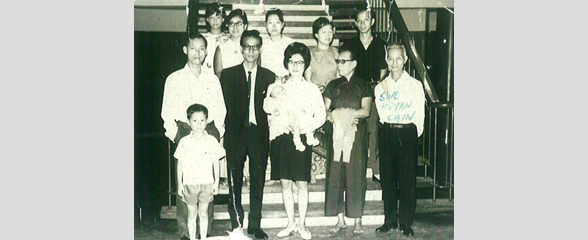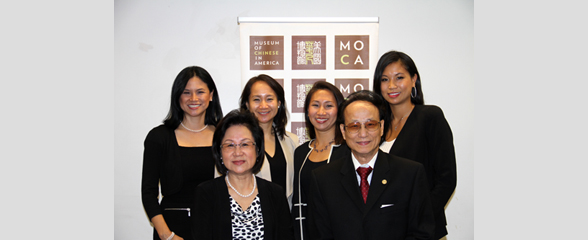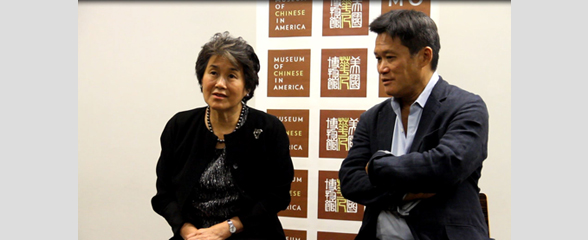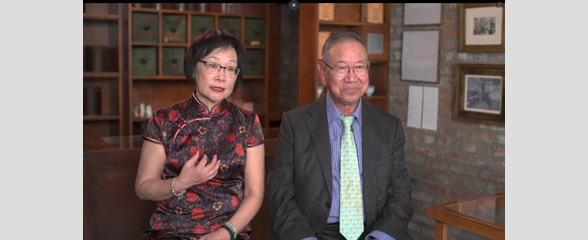Education.

2014.035.001 The Family Journey of The Chin Family - Interview with Gee Fung and Yep Pyu Chin (Peter and Patricia)
Gee Fung (Peter) Chin and Yep Pyu (Patricia) Chin sit down with MOCA to discuss their family’s history and the story of their immigration from Burma to the United States. Peter and Patricia left Burma in 1970 when it was under military rule and decided to immigrate to the United States for more freedoms and economic opportunities. The two had met at Emmanuel Baptist Church in Burma, where they regularly attended Sunday school and youth fellowship. A year after their marriage, they found out that they were accepted as immigrants to the United States and landed in San Francisco with their first-born baby daughter in tow. After arriving only three days, they received a call from an uncle, who convinced them to move to New York. Once in New York, they initially stayed with Peter’s brother-in-law in Harlem but ultimately settled in Borough Park, Brooklyn. The couple briefly reflect on memories of what both neighborhoods were like at that time, and how life slowly became better and better as Peter landed a job and found success as an accountant. Patricia shares how her initial experience of America was colored by difficult first years of motherhood due to having to care for three babies closely spaced together, but she grew to really love living in America. The Chins describe their identity as very much Chinese American because they were raised Chinese and consider themselves as typical Chinese people who respect their parents and celebrate traditional holidays, but are also proudly American. Both take pride and thank God for the close-knit extended family they were able to build. Peter and Patricia each sponsored their parents to live with them in the United States, and even now, they see their own adult children regularly as well. Each bring up stories that they want their daughters to hear, including of Peter’s long lost sister, who was given up as a baby for adoption, and Patricia’s widowed mother, who courageously moved the young family to Burma and worked hard to raise Patricia and her older brother on her own. Peter notes that he earned an MBA and the children were all able to receive advanced degrees and achieve a good life in this country. Because of how blessed they are, they firmly believe that they made the right decision to come to America and want future generations in their family to know that.

2014.035.002 The Family Journey of The Chin Family-Interview with The Chin Sisters
The four sisters Grace Chin Chan, Judy Chin Wong, Anna Chin Tze, and Jennifer Chin Dussich sit down with MOCA to discuss their family history. They begin by describing growing up in Brooklyn and the communities and activities that they participated in there. They recount family stories from vacations and being rebellious teenagers. The sisters take turns discussing how grateful they are for their parents’ sacrifices, but also how they feel so grateful to have been raised with their parents’ values and how they cherish their parents’ legacy. The Chin sisters still have dinner with their parents and families every week and share other lessons from their childhood.

2014.035.003 The Family Journey of The Lee Family
Sandy and Doug Lee sit down with MOCA to discuss the history of their family, as found through archival and family research. They bring up the curio shop that their family kept and finding pictures from this business through a cousin. They discuss the involvement of their father in the U.S. Army and his position as translator for American diplomats who met with Mao and his party. They discuss how their Uncle funded one of the first Chinese-American film companies in the U.S., called Great Wall Films, to challenge American representations of Chinese people in film. They go back to discussing the store on 31 Pell Street, and discuss the beginning and then the history of the store. Their other uncle and their father had insurance and travel businesses in this building as well which still exist today. The businesses in this building grew and changed to adapt to the needs of the growing Chinatown community in San Francisco before the earthquake of 1906. They discuss the impact of the Chinese Exclusion Act on their family, with their relatives having to take long routes to and from China to avoid deportation. The Chinese Exclusion Act was also very isolating for the family, as it prevented them from seeing their other family members back in China. Since their grandmother and grandfather lived in such a dangerous neighborhood at the turn of the century, their grandmother did not go into the street by herself and instead spoke to other women by yelling from fire escape to fire escape. A Church took in their grandmother and taught her American customs and helped with childcare. During the Depression, the family relocated back to Hong Kong with their grandfather staying in Chinatown to run the business. Their father was educated in the U.S. and in Shanghai, which made him valuable as a translator since he knew four dialects of Chinese. Sandy and Doug discuss growing up in Flushing and later Great Neck, Long Island, and their ability to assimilate into American culture. They discuss more family history and then their family’s involvement with MOCA.

2021.026.001 The Family Journey of San Yan Wong & Rosanna Wong
During the interview, Mr. San Yan Wong and Mrs. Rosanna Wong talked about Hunan Garden they owned and how the cooking demonstration attracted customers. They discussed the time when the Confucius Plaza was built and how people applied for it. They also talked about kids’ education, as well as how the family keeps the Chinese culture and traditions. They brought kids back to China often and keep their Chinese ancestry root. Mr, San Yan Wong also shared his publications and calligraphies that he spent his spare time and retirement time to focus. They then talked about their own big families, and their immigration stories. They shared family photographs and gave advice to young generations. In the end, they shared the celebrations of their 50 anniversaries of their marriage.